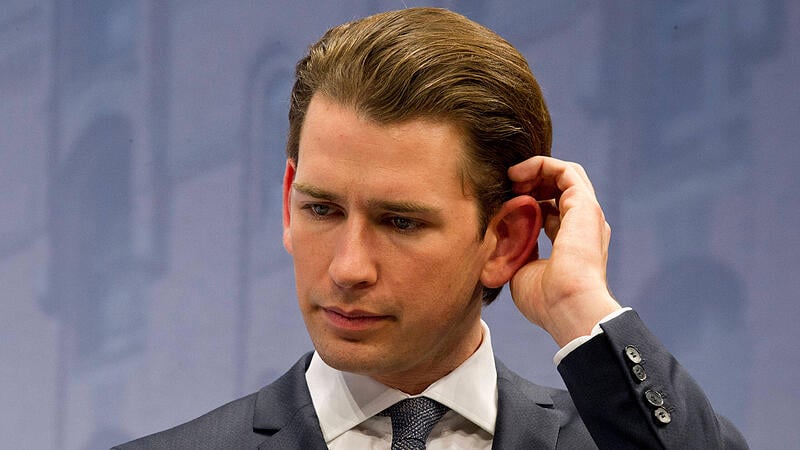Image: Malte Ossowski/SVEN SIMON via www.imago-images.de (www.imago-images.de)
In the film, Kurz is described as a “personification of Austrian charisma” and an “idol for conservatives around the world”.
The documentary designed by Sedlar starts on the same day as the more critical film by the Austrian director Kurt Langbein (“Project Ballhausplatz”), which premiered a week ago on Wednesday. Unlike Langbein, no critical voices have their say in Sedlar. The film In its uncritical view, it tops the film by director Sascha Köllnreiter (“Kurz – the Film”), which observers had confirmed was more useful for PR purposes for Kurz.
“Could walk at ten months”
Sedlar’s 63-minute homage (available for 9.99 on the streaming service Vimeo) consists of a series of image videos and still images from the Kurz era, interrupted by interviews with the ex-chancellor himself and a few selected observers. According to the narrative, Kurz shone with extraordinary things even in childhood: “Far ahead of the children of his age. He could walk at ten months and he spoke complete sentences at a year,” it says right at the beginning in the story spoken by Hollywood actor Armand Assante English language voice-over text.
The speaker calls the ex-politician “Sebastian” almost always in a jovial manner and his achievements, and the admiration for his work is openly displayed: “He represented a real alternative to the typical politicians, because despite his youth, Sebastian was a clever creator a new, modern politics,” one learns, for example. “For Sebastian, politics was never just a job, it was a calling. Something that filled him completely from the time he got up until the night.”
“The flair of a think tank”
Kurz also couldn’t help but get involved in politics because: “Somehow the flair of the think tank of the ÖVP Political Academy accidentally rubbed off on his own family’s house. It must have been passed on to Sebastian over time and Over time, he was taken in by him because he never wanted to become a politician himself, as he often explained.”
The “history books” will say about the Kurz political era that as a young politician he created “a new politics for the 21st century,” it says in the film. Kurz himself can highlight the “fight against illegal migration and for more security” as well as the fight for “more fair performance” as the greatest achievements of his era.
A lot of space is taken up by images of Kurz’s international contacts as well as his commitment to the fight against anti-Semitism and the relationship with Israel. David Harris, former president of the American Jewish Committee, says that Kurz has gone down in history because when he became chancellor there was a clear “yes” to the Israeli state – that was not the case before. The former US ambassador to Austria, Trevor Traina, attested to Kurz that he had made Austria “relevant” internationally again.
Ibiza is only touched upon briefly
The topic of Ibiza is only briefly touched upon (“Then, one day in May 2019, a video of a vice chancellor appeared”), without mentioning ex-vice chancellor Heinz-Christian Strache by name. Kurz’s resignation is also only touched on rudimentarily and the opposition’s complaints are cited as the reason for the investigation. On the domestic political side, only the close companion of the former ÖVP leader Elisabeth Köstinger has a say.
The possibility of Kurz returning to politics is also raised – and certainly welcomed. Ex-ambassador Traina says Kurz now has to wait for the investigation against him until his name is “cleared.” And he expects that Kurz could play a role at EU level in the future.
Admiration for Kurz
The day before, director Sedlar made no secret of his admiration for the ex-chancellor: Kurz was a “charismatic personality,” and there was a lack of such characters these days, he said. He doesn’t know whether Kurz plans to return to politics – but he thinks it’s good “for Europe and the world.” The script for the short film comes from the journalist Judith Grohmann, who wrote an authorized – friendly – biography about Kurz in 2019.
Sedlar has made numerous documentaries since the 1980s. His 2016 film “Jasenovac – the truth” about the extermination camp of the same name in the fascist Croatian Ustasha state NDH (1941-1945) caused controversy. Critics accused the director of taking a selective look at history and trivializing the crimes of the Ustaše.
Sedlar’s film could not be the last with a connection that is too short. As it became known on Thursday, E&A Film Gmbh from Vienna has a project called “Ganz Kurz Kanzler”, which is supposed to be a comedy. When asked, it was not immediately possible to find out whether the project would actually be implemented.
more from culture
Rick Okon on filming “Das Boot”: “It was really cozy there”
“It was Der Hofer, from the Zwanzgerhaus”: Now there’s the crime thriller to go with the song
“I don’t eat my soup. No, I don’t eat my soup”
Lise de la Salle: “I don’t have a memory without music”
: Nachrichten
I am an author and journalist who has worked in the entertainment industry for over a decade. I currently work as a news editor at a major news website, and my focus is on covering the latest trends in entertainment. I also write occasional pieces for other outlets, and have authored two books about the entertainment industry.




